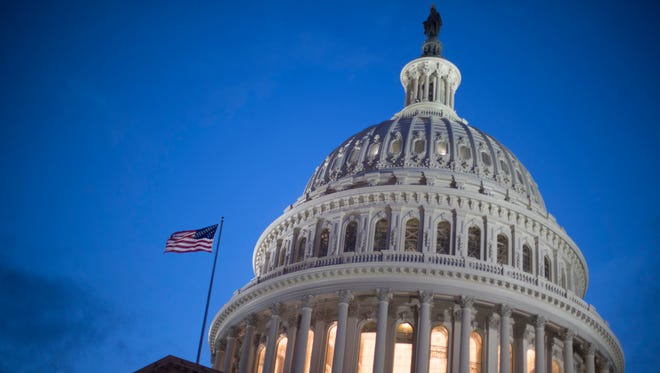Trump comes before Congress, a body he has largely bypassed

WASHINGTON — When President Trump heads to Capitol Hill on Tuesday to address Congress for the first time, he will be talking to lawmakers he sees more as nuisances than allies and has largely bypassed so far by issuing executive orders that don't need their approval, analysts say.
"What's clear to me is that President Trump has no real respect for Congress and would like to govern by executive order, but that's not how our system works," said Elizabeth Sherman, an assistant professor of government in the School of Public Affairs at American University. "He seems totally uncomfortable with the idea that 535 members of Congress are making these major decisions about how to spend money and set tax rates. The only real power he has over Congress is the power to veto a bill."
That hasn't stopped Trump from trying to manage Congress. He has scolded senators for taking too long to approve his Cabinet choices, told Senate leaders that they should throw out their own rules to ensure the confirmation of his Supreme Court nominee, and vowed to seek an amendment to the Constitution to limit the terms of House members and senators.
Members of Congress have pushed back, with Senate Majority Leader Mitch McConnell, R-Ky., declaring that it is up to the Senate and "not the White House" to decide whether to change its rules to allow Judge Neil Gorsuch to be confirmed to the Supreme Court with just 51 votes rather than the 60 required now. Homeland Security Secretary John Kelly also had to apologize recently to bipartisan members of the House Homeland Security Committee for not consulting Congress before carrying out an abrupt, confusing order from Trump to restrict travel to the U.S. by immigrants from certain Muslim-majority nations.

"When you have something like the Trump Organization, you can be a dictator and that's perfectly fine, that's your role," Sherman said. "But he needs to understand that he doesn't have all the power any more. He can't buy one paperclip without an appropriation from Congress."
Trump would do well to strike a conciliatory tone when he addresses Congress, said Donald Wolfensberger, former chief of staff for the House Rules Committee under a Republican majority and a congressional scholar at the Woodrow Wilson International Center for Scholars.
While Democrats will most likely continue to oppose Trump on most issues, the president needs congressional Republicans to help him repeal and replace Obamacare, fund a wall on the Southwest border, boost defense spending and lower taxes on corporations and middle-class families, Wolfensberger said.
As Trump prepares to release his first federal budget next month, he also will soon learn what presidents of both parties before him have discovered — that the document is likely to wind up in the trash as members of Congress craft spending bills that reflect their own priorities, analysts said.
"He needs to let Republicans in Congress know that he's looking forward to working closely with them in developing policy priorities and details," Wolfensberger said.
Read more:
Trump budget to increase defense, slash EPA, other agencies
Democratic legislators in 30 states to rebut Trump's Congress address
Trump to talk priorities in prime-time speech
The problem for Trump is that there is often a difference between what he sees in national polls and what members of Congress are hearing from their local constituents on various issues, said Jack Pitney, a political scientist at Claremont McKenna College in California.
"Every member of Congress has to respond to his or her own constituents, who may support Trump in general but may oppose something like repealing Obamacare because it would hurt them," Pitney said. "So the issue becomes suddenly more complicated than Trump anticipated."
In Trump's defense, he is not the first president to face a potentially testy relationship with Congress, Wolfensberger said. President Clinton was rebuffed by a Democratic Congress in the early 1990s when he tried to move too quickly on health care reform and allowing gays to serve openly in the military.
Still, former presidents Clinton, George W. Bush and Carter had all served as governors who had to learn how to deal with independent-minded legislatures.
"It's going to be a steep learning curve for Trump," Wolfensberger said.
Sherman predicted that Trump will be more bully than conciliator in his dealings with Congress.
"I think he'll come in there (Tuesday night) with all his bombast and bluster and try to convince them that he has the support of the American people, despite the fact that the American people remain more divided than ever," she said. "He's going to try to pressure Congress to do all the things on his agenda."
But, in the end, Congress has the advantage, Pitney said.
"When it comes to the details of the budget or other legislation, Congress holds the upper hand," Pitney said. "Trump can threaten Congress all he wants but, unless he compromises with them, he's not going to get anything done."
Read more:
The first 100 days of the Trump presidency
Here's how to watch Trump's joint address to Congress
